

British MOOC provider FutureLearn expands to the U.S. The British massive open online courses are coming.
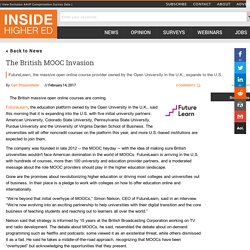
FutureLearn, the education platform owned by the Open University in the U.K., said this morning that it is expanding into the U.S. with five initial university partners: American University, Colorado State University, Pennsylvania State University, Purdue University and the University of Virginia Darden School of Business. The universities will all offer noncredit courses on the platform this year, and more U.S. -based institutions are expected to join them. The company was founded in late 2012 -- the MOOC heyday -- with the idea of making sure British universities wouldn't face American domination in the world of MOOCs. FutureLearn is arriving in the U.S. with hundreds of courses, more than 100 university and education provider partners, and a moderated message about the role MOOC providers should play in the higher education landscape. UVA offers dozens of MOOCs on Coursera. St. George's offers best practices on MOOC design for international audiences.
In 2013, officials at St.
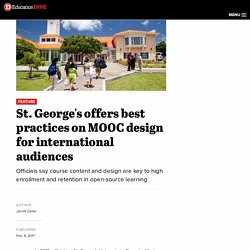
George’s University in Grenada, West Indies launched their first massive online open course "One Health, One Medicine: A Global Health Approach," promoting on-demand learning modules to students with interest in pre-medical or pre-veterinary training. Officials capped the eight-week course at 1,000 students to better assess the learning outcomes of students and delivery methods. And in the years since, the institution has redesigned the course to refine its presentation, enrollment strategy and capacity to engage students from around the world. In its fourth edition, the MOOC now attracts an annual average of 800 learners and offers educational and professional certification credits for participants. Dr. Time to act: UK universities will be overtaken unless they embrace new technology. The report reviews best practice around the world to show how technology is benefiting universities and students through better teaching and learning, improved retention rates and lower costs: In the US, curriculum redesign using technology-enhanced learning produced better student outcomes in 72% of projects and average savings of 31%; in Australia, the University of New England reduced student drop-out rates from 18% to 12% via learning analytics; and in the UK at Nottingham Trent University, 81% of first-year students increased their study time after seeing their own engagement data.
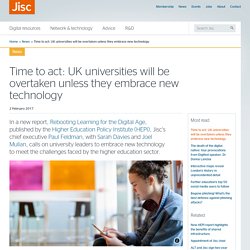
Paul Feldman, chief executive of Jisc said: “The Teaching Excellence Framework (TEF) puts universities under pressure to improve student satisfaction, retention and employability while managing costs. 7 Insights from HarvardX and MITx's Year 4 Report — Class Central. A joint research team from Harvard University and MIT recently released their findings from four years’ worth of their courses on edX.
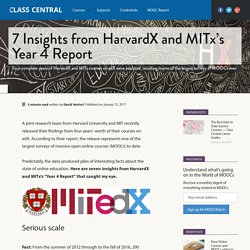
According to their report, the release represents one of the largest surveys of massive open online courses (MOOCs) to date. Predictably, the data produced piles of interesting facts about the state of online education. Harvard rolls out adaptive tech for MOOC offerings. Dive Brief:
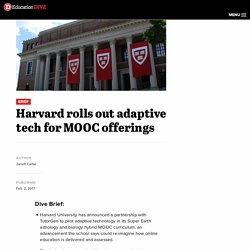
How the Pioneers of the MOOC Got It Wrong. In 2011, when Stanford computer scientists Sebastian Thrun and Peter Norvig came up with the bright idea of streaming their robotics lectures over the Internet, they knew it was an inventive departure from the usual college course.
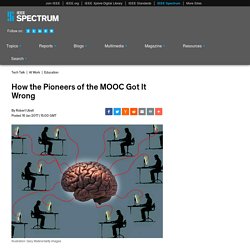
For hundreds of years, professors had lectured to groups of no more than a few hundred students. But MOOCs—massive open online courses—made it possible to reach many thousands at once. Through the extraordinary reach of the Internet, learners could log on to lectures streamed to wherever they happened to be. XuetangX: A Look at China's First and Biggest MOOC Platform — Class Central. The Open Source School Redefines Education in Italy. Translation by Nicole Stojanovska.
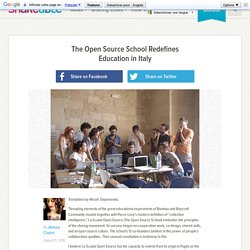
Threading elements of the great educational experiments of Bauhaus and Roycroft Community models together with Pierre Levy’s modern definition of “collective intelligence,” La Scuola Open Source (The Open Source School) embodies the principles of the sharing movement. Its success hinges on cooperative work, co-design, shared skills, and an open source culture. Are micro-degrees the future of higher education?
We live in tiny houses, make micropayments and use mini fridges.
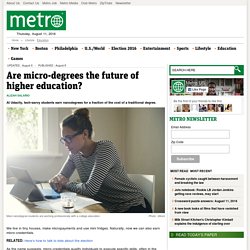
Naturally, now we can also earn micro-credentials. RELATED: Here's how to talk to kids about the election As the name suggests, micro-credentials quailfy individuals to execute specific skills, often in the fields math, science and technology. Harvard, Cal-Berkeley take MOOCs to next level. Dive Brief: Harvard University and the University of California, Berkeley are transforming the online learning experience in their graduate schools of business, using enhanced technology to increase production value and to simulate an in-person classroom experience.
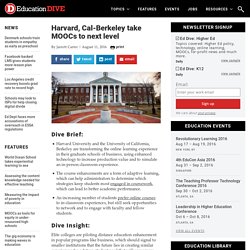
The course enhancements are a form of adaptive learning, which can help administrators to determine which strategies keep students most engaged in coursework, which can lead to better academic performance. An increasing number of students prefer online courses to in-classroom experiences, but still seek opportunities to network and to engage with faculty and fellow students. Dive Insight: Elite colleges are piloting distance education enhancement in popular programs like business, which should signal to smaller institutions that the future lies in creating similar experiences for a future student pool that will grow more eager for the convenience and affordability of online learning.
Recommended Reading. How to fix the college lecture. Dive Brief: A recent study indicates lecture hall-style classes increase the probability of failure by 55%.
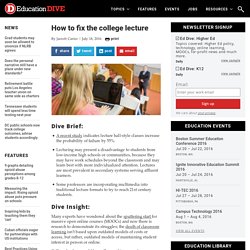
Lecturing may present a disadvantage to students from low-income high schools or communities, because they may have work schedules beyond the classroom and may learn best with more individualized attention. Lectures are most prevalent in secondary systems serving affluent learners. Some professors are incorporating multimedia into traditional lecture formats to try to reach 21st century students. 'Top universities to offer full degrees online in five years' Image copyright Thinkstock Leading universities will offer fully accredited undergraduate courses online within five years, says the founder of a leading US online university network.
Daphne Koller, chief executive of Coursera, said the technology was available but universities had been hesitant about their "reputation". So far, online courses have mostly offered certificates for short courses rather than full degrees. Online Learning as a Viable Option For Building Real Time Skills. By Paul LeBlanc Should you enroll in an online course or program?
For the last twenty years there were two primary reasons for saying “yes”–convenience and access. 8 Ways to Design Sticky MOOCs. This is a guest post from Donald Clark. It was originally published here. Increasing persistence Many of the arguments around course completion in MOOCs are, I have argued, category mistakes. FutureLearn Steps into the World of MOOC-Based Credentials With "FutureLearn Programs" Study: Higher ed falling behind fast in digital transformation. Dive Brief: A study of college and university digital content management practices found schools are doing little more than publishing content, missing opportunities to deliver experiences and better engage students. Campus Technology reports the study, commissioned by five companies interested in higher ed digital business opportunities, found many schools overwhelmed by basic demands of maintaining the institution's web presence with little bandwidth to shift from content publishing to digital storytelling.
Report authors expect many colleges and universities will not be motivated to improve their digital content until they see negative consequences in student enrollment, but researchers say that will leave them playing catch up. MOOCs - EduOpen. University of Toronto instructors’ experiences with developing MOOCs. Hedieh Najafi, Carol Rolheiser, Laurie Harrison, and Stian Håklev University of Toronto, Canada Abstract We interviewed eight University of Toronto (U of T) instructors who have offered MOOCs on Coursera or EdX between 2012 and 2014 to understand their motivation for MOOC instruction, their experience developing and teaching MOOCs, and their perceptions of the implications of MOOC instruction on their teaching and research practices.
Udacity Connect Offers Face-to-Face Sessions. How MOOCs Foil Distraction. The Results of Integrating a MOOC Into On-Campus Teaching. Dr. Class Central's MOOC Report. JITEv14IIPp125 143Drake0888. Is the Traditional College Education an Endangered Species? 10 ways MOOCs have forced Universities into a rethink. University chiefs share 3 takeaways on evolving role of accreditation [CHEA 2016] Among the many diverse and complex challenges faced by those in what is essentially a college or university's chief executive officer position is accreditation. A school's credentials are given weight by the seal of approval from institutional accreditors — and, for many individual programs, professional accreditors. Moocs: international credit transfer system edges closer. Universities are set to pilot a global credit transfer system that will allow students to use courses taken online to count towards their degrees.
Making Open Educational Resources Count. View to a skill: The next big education player? 29 October 2013Last updated at 20:00 ET By Sean Coughlan BBC News education correspondent Not the San Francisco Bay area, but the Galway Bay area for this digital firm. DMLcentral. MOOCs, Hype, and the Precarious State of Higher Ed: Futurist Bryan Alexander.
Students are cool with MOOCs, so why aren’t profs? Kalz: If MOOCs are the answer, did we ask the right questions? MOOC magazine on Flipboard. Siemens: Disruptor, Saviour, or Distractor: MOOCs and their role in higher education. Ernst & Young University of the Future. Learning, networks, knowledge, technology, community. Open, Participatory, Student-centric, Social...the Future? Transforming Assessment.